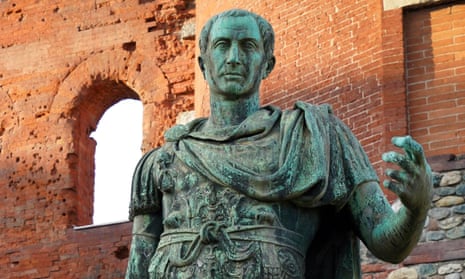‘Red Caesarism’ is rightwing code – and some Republicans are listening
Argument for a ‘red Caesar’ to rule US may seem esoteric but conservative thinktank behind idea has connections to Trump
 For the last three years, some on the right have advocated for ‘Caesarism’. Photograph: Panther Media GmbH/Alamy
For the last three years, some on the right have advocated for ‘Caesarism’. Photograph: Panther Media GmbH/AlamyJason Wilson
Sun 1 Oct 2023
In June, rightwing academic Kevin Slack published a book-length polemic claiming that ideas that had emerged from what he called the radical left were now so dominant that the US republic its founders envisioned was effectively at an end.
Slack, a politics professor at the conservative Hillsdale College in Michigan, made conspiratorial and extreme arguments now common on the antidemocratic right, that “transgenderism, anti-white racism, censorship, cronyism … are now the policies of an entire cosmopolitan class that includes much of the entrenched bureaucracy, the military, the media, and government-sponsored corporations”.
In a discussion of possible responses to this conspiracy theory, he wrote that the “New Right now often discusses a Red Caesar, by which it means a leader whose post-Constitutional rule will restore the strength of his people”.

Biden warns voters a second Trump presidency will threaten democracy
For the last three years, parts of the American right have advocated a theory called Caesarism as an authoritarian solution to the claimed collapse of the US republic in conference rooms, podcasts and the house organs of the extreme right, especially those associated with the Claremont Institute thinktank.
Though on the surface this discussion might seem esoteric, experts who track extremism in the US say that due to their influence on the Republican party, the rightwing intellectuals who espouse these ideas about the attractions of autocracy present a profound threat to American democracy.
Their calls for a “red Caesar” are now only growing louder as Donald Trump, whose supporters attempted to violently halt the election of Joe Biden in 2020, has assumed dominant frontrunner status in the 2024 Republican nomination race. Trump, who also faces multiple criminal indictments, has spoken openly of attacking the free press in the US and having little regard for American constitutional norms should he win the White House again.
The idea that the US might be redeemed by a Caesar – an authoritarian, rightwing leader – was first broached explicitly by Michael Anton, a Claremont senior fellow and Trump presidential adviser.
Anton has been an influential rightwing intellectual since in 2016 penning The Flight 93 Election, a rightwing essay in which he told conservatives who were squeamish about Trump “charge the cockpit or you die”, referencing one of the hijacked flights of 9/11.
He gave Caesarism a passing mention in that essay, but developed it further in his 2020 book, The Stakes, defining it as a “form of one-man rule: halfway … between monarchy and tyranny”.
The Guardian contacted Anton at his Claremont Institute email address, but received no response.
Anton and others in the Claremont milieu are not simply hypothesizing about the future: their dreams of Caesar arise from their dark view of the US.
Anton wrote the scene-setting essay in Up From Conservatism, an anthology of essays published this year and edited by the executive director of Claremont’s Center for the American Way of Life, Arthur Milikh.

Michael Anton, a former adviser to President Trump, described Caesarism as a ‘form of one-man rule: halfway … between monarchy and tyranny’.
Photograph: Pablo Martínez Monsiváis/AP
In that essay Anton writes baldly that “the United States peaked around 1965”, and that Americans are ruled by “a network of unelected bureaucrats … corporate-tech-finance senior management, ‘experts’ who set the boundaries of acceptable opinion, and media figures who police those boundaries”.
His diagnosis of US social and cultural life unfolds under a series of subheadings that are almost comical in their disillusionment: “The universities have become evil”, “Our economy is fake”, “The people are corrupt”, “Our civilization has lost the will to live”.
Damon Linker, a senior lecturer at the University of Pennsylvania and an author of several books on the American right, was early in noticing the extreme right’s drift towards Caesarism.

Linker told the Guardian that Anton and others in the Claremont milieu “have convinced themselves thoroughly that the current order is decadent, corrupt and far removed from the proper, admirable origins of American government”.
Linker said their current view is related to a long-held position among Claremont scholars that “democracy as they understand has been supplanted by bureaucrats and entrenched executive branch departments”.
“The fact that Trump lost in 2020 has just radicalized a lot of these people – it occurred to them that they might not win a proper election again,” he said.
“That would mean that – excuse the language–they’re shit out of luck unless there’s some other path to power. That’s where Caesarism comes in.”
If Trump wins in 2024, does he listen to people like Michael Anton about the need to perhaps cancel the next election?Damon Linker
Linker said that the danger in such ideas is not that the American people will actively choose a dictatorship, but more in how they might shape the rightwing response to a future emergency
In that essay Anton writes baldly that “the United States peaked around 1965”, and that Americans are ruled by “a network of unelected bureaucrats … corporate-tech-finance senior management, ‘experts’ who set the boundaries of acceptable opinion, and media figures who police those boundaries”.
His diagnosis of US social and cultural life unfolds under a series of subheadings that are almost comical in their disillusionment: “The universities have become evil”, “Our economy is fake”, “The people are corrupt”, “Our civilization has lost the will to live”.
Damon Linker, a senior lecturer at the University of Pennsylvania and an author of several books on the American right, was early in noticing the extreme right’s drift towards Caesarism.

Linker told the Guardian that Anton and others in the Claremont milieu “have convinced themselves thoroughly that the current order is decadent, corrupt and far removed from the proper, admirable origins of American government”.
Linker said their current view is related to a long-held position among Claremont scholars that “democracy as they understand has been supplanted by bureaucrats and entrenched executive branch departments”.
“The fact that Trump lost in 2020 has just radicalized a lot of these people – it occurred to them that they might not win a proper election again,” he said.
“That would mean that – excuse the language–they’re shit out of luck unless there’s some other path to power. That’s where Caesarism comes in.”
If Trump wins in 2024, does he listen to people like Michael Anton about the need to perhaps cancel the next election?Damon Linker
Linker said that the danger in such ideas is not that the American people will actively choose a dictatorship, but more in how they might shape the rightwing response to a future emergency
“If Trump wins in 2024, what does the opposition do, and how does he respond?” Linker speculated. “Does he send in the troops? Does that lead to bigger protests?”
“If he then declares martial law, do these ideas prepare people in the Republican party to say, ‘Well, we need law and order’?,” Linker asked.
“Does Trump then listen to people like Michael Anton and his friends about the need to perhaps cancel the next election?”
Underlining this danger is the fact that Caesarism has won converts beyond Claremont as a solution to perceived decadence and the declining electoral appeal of far-right ideas.
Charles Haywood, a former industrialist the Guardian exposed last month as the founder of a secretive fraternal lodge and a would-be warlord, wrote in 2021 that “I like, if not love, the idea of Red Caesar” since “Caesarism, and its time-legitimated successor, monarchy, is a natural, realism-based system, under which a civilization can flourish”.

US businessman is wannabe ‘warlord’ of secretive far-right men’s network
The idea has been lodged in the broader sphere of conservative debate in rightwing writer Stephen Wolfe’s book The Case for Christian Nationalism, in which he proposes a “Christian prince” whose rule would be “a measured and theocratic Caesarism”, and might perhaps be installed by “a just revolution” against secular rule.
Caesarism and other antidemocratic ideas bemuse many observers, including some with whom they might otherwise share common ground.
Thomas Merrill is a political theorist and an associate professor at American University in Washington DC, who has written critically on the Claremont Institute, but from a broadly conservative perspective.
“We’re cousins,” he said of Claremont intellectuals in a telephone conversation, “and sometimes you have to ask your cousin, what the hell are you doing?”
He said that the authoritarian drift exhibited in work like Anton’s was an example of “the Claremont guys shooting themselves in the foot”. For Merrill, while he agrees that the ideas are dangerous, he thinks they have an air of compensatory fantasy.
“They’re selling a very dark picture of the world to conservative donors without going out and doing the hard work of democratic politics.”
For Linker, the author and lecturer, a far-right dictatorship remains “a tail-end, worst-case scenario”, but one that is more realistic in the US now than it has been for many decades.
“Thirty years ago, if I told you that a bunch of billionaires and intellectuals on the right are waiting in the wings to impose a dictatorship on the United States, you would have said that I was insane,” he said.
“But it’s no longer insane. It’s now real. There are those people out there,” Linker added. “The question is: will they get their chance.”
“If he then declares martial law, do these ideas prepare people in the Republican party to say, ‘Well, we need law and order’?,” Linker asked.
“Does Trump then listen to people like Michael Anton and his friends about the need to perhaps cancel the next election?”
Underlining this danger is the fact that Caesarism has won converts beyond Claremont as a solution to perceived decadence and the declining electoral appeal of far-right ideas.
Charles Haywood, a former industrialist the Guardian exposed last month as the founder of a secretive fraternal lodge and a would-be warlord, wrote in 2021 that “I like, if not love, the idea of Red Caesar” since “Caesarism, and its time-legitimated successor, monarchy, is a natural, realism-based system, under which a civilization can flourish”.

US businessman is wannabe ‘warlord’ of secretive far-right men’s network
The idea has been lodged in the broader sphere of conservative debate in rightwing writer Stephen Wolfe’s book The Case for Christian Nationalism, in which he proposes a “Christian prince” whose rule would be “a measured and theocratic Caesarism”, and might perhaps be installed by “a just revolution” against secular rule.
Caesarism and other antidemocratic ideas bemuse many observers, including some with whom they might otherwise share common ground.
Thomas Merrill is a political theorist and an associate professor at American University in Washington DC, who has written critically on the Claremont Institute, but from a broadly conservative perspective.
“We’re cousins,” he said of Claremont intellectuals in a telephone conversation, “and sometimes you have to ask your cousin, what the hell are you doing?”
He said that the authoritarian drift exhibited in work like Anton’s was an example of “the Claremont guys shooting themselves in the foot”. For Merrill, while he agrees that the ideas are dangerous, he thinks they have an air of compensatory fantasy.
“They’re selling a very dark picture of the world to conservative donors without going out and doing the hard work of democratic politics.”
For Linker, the author and lecturer, a far-right dictatorship remains “a tail-end, worst-case scenario”, but one that is more realistic in the US now than it has been for many decades.
“Thirty years ago, if I told you that a bunch of billionaires and intellectuals on the right are waiting in the wings to impose a dictatorship on the United States, you would have said that I was insane,” he said.
“But it’s no longer insane. It’s now real. There are those people out there,” Linker added. “The question is: will they get their chance.”

No comments:
Post a Comment